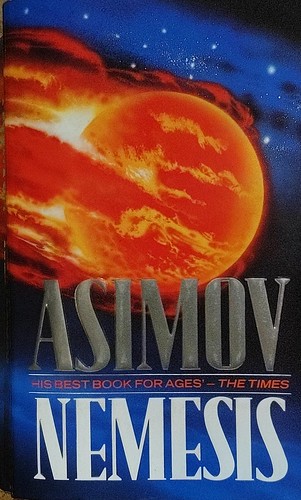 Sci-fi trash from Asimov. Wiki will tell you about it, but not whether it is any good. Goodreads likes it. I read the middle portion until late in the night. But... after that it gets less good.
Sci-fi trash from Asimov. Wiki will tell you about it, but not whether it is any good. Goodreads likes it. I read the middle portion until late in the night. But... after that it gets less good.The underlying story line is reasonable, and mostly reasonably handled, but it is too long and gets rather bogged down.
A pattern I've seen before: the "scientist" characters make wild guesses which the (should) know full well they haven't got the data to back up, and then hold fast to those guesses, pointlessly. They have long book-filling discussions about those guesses that add little to the plot but much to the thickness of the book. Example: did "Rotor" survive the trip out to Nemesis?
Another pattern: space travel is absurdly over-personalised and ad-hoc. Our Strong Female Lead invents FTL travel (well, the hyperspace travel of the Foundation series); and then also leads the engineering to produce a space ship; and then actually travels on the space ship. Just like Werner von Braun did... oh, wait. When the five-person crew heads off they, utterly absurdly, have no plans, have thought through no contingencies, and have no instructions from Earth. Although the SFL is the nominal captain the authority structure is weak because they're all scientists, and yet absurdly that hasn't been thought through either. The people in charge stay in charge throughout decades, because inventing new characters is hard.
The FTL-ish stuff is murky, but I think this is valid too: various groups "leave" the solar system, and people wonder where they're going to. But never ever does the book discuss what direction they're going in. Implicitly, you travel through hyperspace "in the direction you're going" because nav in hyperspace is never mentioned, and yet it never occurs to anyone to just track the fucking things as they leave the solar system to see which way they're pointing. This is such a massive plot hole I think Asimov must have seen it, but because he was unable to fill it he had to hope his readers wouldn't see it.
The other weirdness is the "Captain Scarlet" effect: no-one ever does anything twice, another pattern. So: Rotor leaves, with the hyper-assistance that only they have. But, pretty soon, lots of other people have it. But no-one uses it. Even though it would get you to the stars. Or it could get you automated probes. Absolutely no-one uses it, and the characters mumble some pathetic justification that makes no sense.
Lastly, the characters. Asimov doesn't do these very well, and was better off in the Foundation when things were story-lead. So the long tedious intense scenes where a mother obsesses over losing control of her daughters life, and absolutely no-one says to her "you can't live through you children let her go" are just dull, and after a bit I blipped though them.
Trivia: when first doing FTL, the characters witter about maybe hyperspace is dangerous because of, sort-of, tidal effects. On their small spaceship. But they've forgotten that an 8 km space station has already travelled.
Oh (sorry, one more thing): to be scientifically plausible, Nemesis has to take 5 kyr to get to the solar system. This is such a long time frame that worrying about finding out or doing something in a decade, or a century, would obviously be silly. But that's what all the characters do, and therefore they all sound silly. They invent implausible reasons why it might be necessary to start really soon. Such as: getting 8 billion people off will take a long time. And no-one ever notices that those 8 billion are going to die at the end of their natural lifespace a long time before there is any problem.
And I forgot: there's a bit of racial-politics type stuff in there. Earth is mixed. The space settlements have somehow sorted themselves and tend to be racially uniform (although the book contains no suggestion that it is unfairly so: they are sorted, but no-one says "oh and BTW the blacks are all stuck on Earth). The Earth-type characters tend to think this is bad, and there are suggestions that the Rotor leader is racist. And then towards the end people burble about "will the glactic civ whatever it looks like repeat Earth's mistakes" and so on. But it is a thin layer spread on top of and clearly separable from the story; if he wanted to say anything he needed to try harder.
Aand: our hereoes show a remarkable lack of interest in the planetary scale intelligence they find. It is potentially billions of years old, and yet they ask it no questions. Did anyone else visit? Does it know of any other intelligences? They don't give a toss. Is it human-level, or waaay above human level? They simply don't care. Does it know any interesting new physics or mathematics or moral philosophy? They are not interested. Why not? For a couple of reasons. Mostly, because the PSI is but a plot device, and so our author is not interested in it. But also, because either he has no interesting answers to any of these questions - in which case it is better to pretend they don't exist - or he does, in which case those answers would be more interesting than the rest of the book, which would be embarassing.
No comments:
Post a Comment